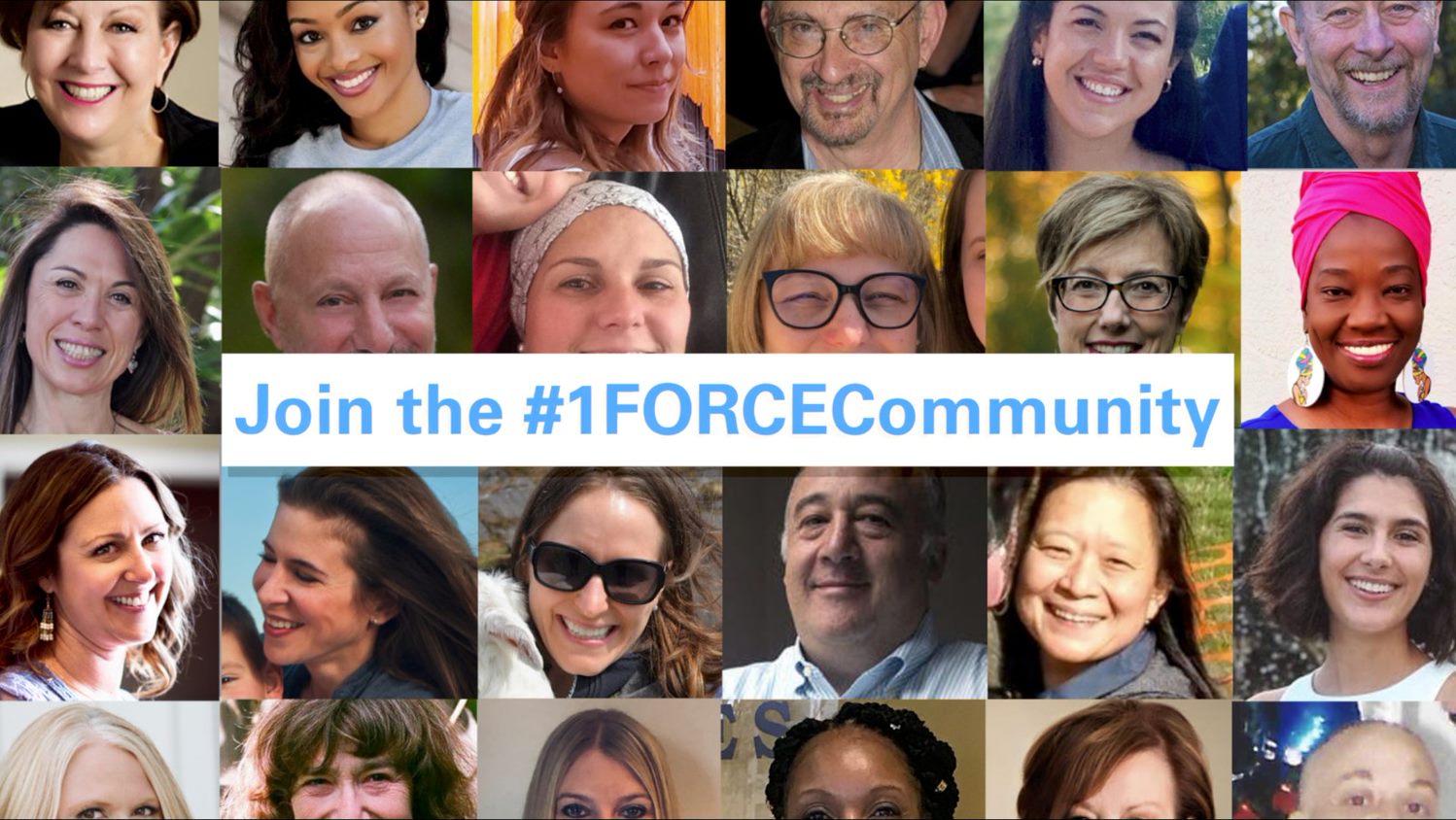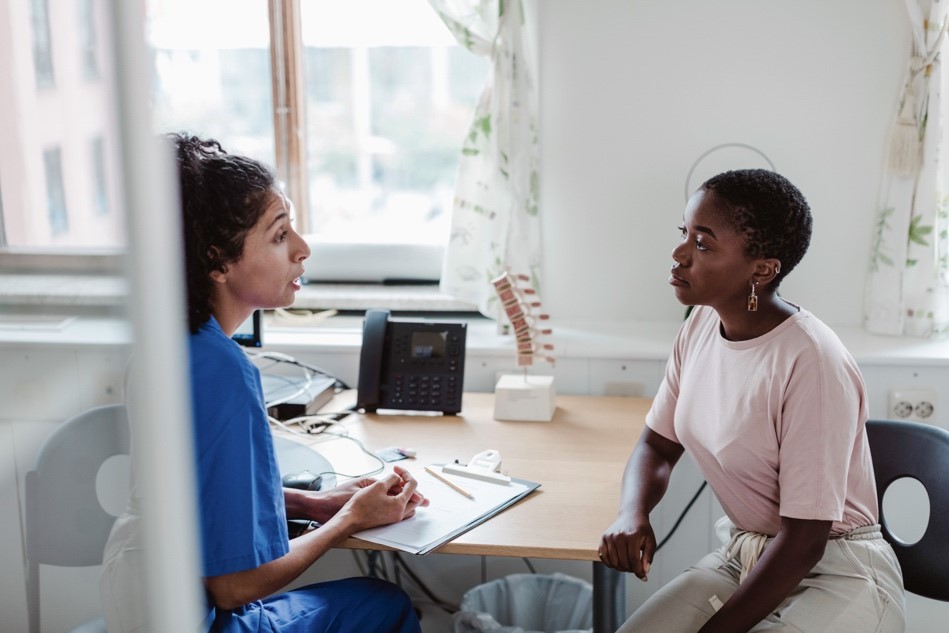| Get Support Donate Get Involved Attend Local Event |

|
Through your generosity, we met our match! 
We greatly appreciate all who donated at year-end and throughout 2020. We surpassed the matching gift challenge of raising $100,000 at year-end through those kinds gifts, proving that even in a very difficult year, we stand together to support our community. Thanks to the generosity of our donors, FORCE will continue to make a difference for the hereditary cancer community in 2021.
|
Can high-risk women delay ovary removal and still reduce ovarian cancer risk?  Women at high risk for ovarian cancer due to an inherited mutation supported reducing their risk by removing fallopian tubes early and delaying removal of ovaries. This approach was favored by women worried about sexual dysfunction associated with surgical menopause. #helpnothype View our XRAY article
|
Meet our growing community  The new year can be a time for expansion and growth. At FORCE we are happy to be growing and welcoming all those with hereditary breast, colorectal, endometrial, ovarian, pancreatic and prostate cancers as a result of a BRCA, ATM, PALB2, CHEK2, PTEN or other inherited gene mutation and those diagnosed with Lynch syndrome. If you know someone who can benefit from our growing community, please let them know they have a home here.
Meet our growing FORCE community
|
Volunteer spotlight: Ashley Dedmon  This month we shine the light on an extraordinary volunteer! Thank you, Ashley, for empowering individuals with tools and resources to make informed decisions regarding their own health as a Peer Navigator volunteer, an author of The Big Discovery (a book that helps children understand a cancer diagnosis), a TEDx Talk speaker in "The Generational Impact of Cancer: BRCA2 Positive" and an advocate for health equity projects for the African American population. If you are interested in helping our community, please complete a VolunteerFORCE application today.
Read Ashley's story
|
FORCE weighs in on colon cancer screening guidelines  Increased risk of colorectal cancer is associated with Lynch syndrome and other inherited genetic mutations such as CHEK2. FORCE recently submitted comments on new national guidelines recommending that people at “average risk” start screening for this cancer at age 45. We asked for additional guidance on identifying individuals at increased risk so they can undergo genetic counseling and testing, and start screening at earlier ages as appropriate.
Read more
|
"We don’t only pass this cancer gene, we pass courage and strength"- Read our latest blogs  Following a "routine" colonoscopy less than two years after her last one, Maria Jamie woke up to the news of probable colon cancer. Read more about her family and their Lynch mutation. Subscribe to our blog digest for personal stories and deeper insights into issues that affect our community. Recent topics include:
FORCE Blog
|
Virtual support is available  You are not alone! You can connect with peers and trained volunteers who understand the decisions you face.
|
Navigation portals connect people to information, research and support resources  FORCE has new portal pages with links to information, research and support resources. Find relevant information organized by topic, cancer type or gene mutation: FORCE has new portal pages with links to information, research and support resources. Find relevant information organized by topic, cancer type or gene mutation:
|
Find hereditary cancer studies and participate in research! 
Please visit our Search and Enroll Tool to find and participate in research studies enrolling patients, like you.
Find research studies
|
Clinical trials and research studies need participants The research studies below are enrolling people with, or at high risk for, hereditary cancer.
|
Genetic vaccine for the treatment of MSI-H colorectal, gastric and gastro-esophageal junction tumors
 The goal of this cancer treatment study is to find the best dose and learn how safe and effective this cancer vaccine is for treating advanced colorectal, gastric and gastro-esophageal junction tumors that test positive for the biomarkers MSI-High or dMMR. The goal of this cancer treatment study is to find the best dose and learn how safe and effective this cancer vaccine is for treating advanced colorectal, gastric and gastro-esophageal junction tumors that test positive for the biomarkers MSI-High or dMMR.
Learn more about the study
|
TALAPRO-2, A Metastatic Castration-resistant Prostate Cancer Research Study
 Living with advanced prostate cancer can feel overwhelming. TALAPRO-2 is a clinical trial investigating a potential treatment for patients with metastatic castration-resistant prostate cancer (mCRPC) who have DNA damage repair (DDR) deficiency. To learn more, visit the TALAPRO-2 website. Living with advanced prostate cancer can feel overwhelming. TALAPRO-2 is a clinical trial investigating a potential treatment for patients with metastatic castration-resistant prostate cancer (mCRPC) who have DNA damage repair (DDR) deficiency. To learn more, visit the TALAPRO-2 website.
Learn more
|
SOROCk study for women with a BRCA1 mutation
 Women with a BRCA1 mutation ages 35-50 at risk for ovarian cancer are eligible for the SOROCk study. SOROCk will determine if removal of the fallopian tubes alone can reduce the risk of ovarian cancer nearly as much as removing both the ovaries and fallopian tubes. Preserving the ovaries will prevent surgically-induced menopause. The study will also examine quality of life. Women with a BRCA1 mutation ages 35-50 at risk for ovarian cancer are eligible for the SOROCk study. SOROCk will determine if removal of the fallopian tubes alone can reduce the risk of ovarian cancer nearly as much as removing both the ovaries and fallopian tubes. Preserving the ovaries will prevent surgically-induced menopause. The study will also examine quality of life.
Learn more
|
Denosumab and mammographic density in premenopausal women with dense breasts  This study is looking at the effect of denosumab on breast density of premenopausal women who have dense breasts. Denosumab is an FDA-approved medication for osteoporosis and to prevent fractures in cancer patients with bone metastases. This study could help identify new ways to prevent breast cancer in younger women. This study is looking at the effect of denosumab on breast density of premenopausal women who have dense breasts. Denosumab is an FDA-approved medication for osteoporosis and to prevent fractures in cancer patients with bone metastases. This study could help identify new ways to prevent breast cancer in younger women.
Learn about the study
|
Study for people with unexpected genetic results  Did you receive an unexpected genetic test result related to cancer risk? A new study is recruiting people who had genetic testing done for some other reason and received results related to their cancer risks. The goal of this study is to learn what people think about, and how they use results like this. Did you receive an unexpected genetic test result related to cancer risk? A new study is recruiting people who had genetic testing done for some other reason and received results related to their cancer risks. The goal of this study is to learn what people think about, and how they use results like this.
Learn more about the study
|
A study to evaluate rucaparib in patients with solid tumors and with deleterious mutations in HRR genes (LODESTAR) 
The LODESTAR study is evaluating the response of the PARP inhibitor rucaparib in people with advanced solid tumors (including breast, ovarian, pancreatic, prostate and other cancers) who have an inherited or acquired mutation in any of the following genes: BRCA1, BRCA2, PALB2, RAD51C, RAD51D, BARD1, BRIP1, FANCA, NBN, RAD51 or RAD51B.
Learn more about LODESTAR
|
ELLIE's Project 
Do you have a genetic mutation increasing your risk of cancer? Help inform us how future research on lifestyle habits can better serve YOU! Take a 20-minutes survey to learn about nutrition and exercise in relationship to hereditary cancer mutations.
Take the survey
|
IMMray™ PanCan-d Test for early detection of pancreatic cancer in high-risk groups
 The Study of IMMray™ PanCan-d Test for Early Detection of Pancreatic Cancer in High-risk Groups is enrolling people who do not have pancreatic cancer, but have a higher risk of developing the disease. The Study of IMMray™ PanCan-d Test for Early Detection of Pancreatic Cancer in High-risk Groups is enrolling people who do not have pancreatic cancer, but have a higher risk of developing the disease.
Learn more
|
Pilot study of denosumab in BRCA1 or BRCA2 mutation carriers scheduling risk-reducing Salpingo-Oophorectomy  Are you a BRCA1 or BRCA2 mutation carrier scheduled to have your fallopian tubes and ovaries removed? Learn about an opportunity to enroll in a clinical trial looking at the effects of denosumab on the ovaries, fallopian tubes, and uterus (for women getting a hysterectomy) of women with a BRCA1 or BRCA2 mutation. Denosumab is an FDA-approved injectable medication that is used to treat osteoporosis and to prevent fractures in cancer patients with bone metastases. The eventual goal is to understand if denosumab may be used to reduce the risk of ovarian cancer in women with a BRCA1 or BRCA2 mutation. Are you a BRCA1 or BRCA2 mutation carrier scheduled to have your fallopian tubes and ovaries removed? Learn about an opportunity to enroll in a clinical trial looking at the effects of denosumab on the ovaries, fallopian tubes, and uterus (for women getting a hysterectomy) of women with a BRCA1 or BRCA2 mutation. Denosumab is an FDA-approved injectable medication that is used to treat osteoporosis and to prevent fractures in cancer patients with bone metastases. The eventual goal is to understand if denosumab may be used to reduce the risk of ovarian cancer in women with a BRCA1 or BRCA2 mutation.
Learn more
|
Screening for men at high genetic risk for prostate cancer  CALLING ALL MEN WITH A BRCA MUTATION, A LYNCH SYNDROME MUTATION or one of the other mutations listed below! The National Institutes of Health has a clinical trial for men at high genetic risk for prostate cancer. This is trial is for men without prostate cancer, ages 30 to 75, who have tested positive for Lynch syndrome (MLH1, MSH2, MSH6, PMS2, EPCAM) or BRCA1, BRCA2, HOXB13, ATM, NBN, TP53, BRIP1, CHEK2, PALB2, RAD51D, FANCA. The trial involves screening MRI of the prostate every two years and biopsy of the prostate if the MRI is abnormal. There is no cost for travel or study-related tests. CALLING ALL MEN WITH A BRCA MUTATION, A LYNCH SYNDROME MUTATION or one of the other mutations listed below! The National Institutes of Health has a clinical trial for men at high genetic risk for prostate cancer. This is trial is for men without prostate cancer, ages 30 to 75, who have tested positive for Lynch syndrome (MLH1, MSH2, MSH6, PMS2, EPCAM) or BRCA1, BRCA2, HOXB13, ATM, NBN, TP53, BRIP1, CHEK2, PALB2, RAD51D, FANCA. The trial involves screening MRI of the prostate every two years and biopsy of the prostate if the MRI is abnormal. There is no cost for travel or study-related tests.
Learn more about the study
|
A study in advanced breast cancer patients with BRCA 1/2 mutations evaluating olaparib alone or in combination with atezolizumab  This is a study for women or men who have been diagnosed with advanced breast cancer with a BRCA 1/2 mutation. The goal of this study is to look at whether giving the DNA damage repair inhibitor (PARP inhibitor) olaparib (Lynparza) in combination with the immunotherapy atezolizumab (Tecentriq) improves outcomes for patients compared to olaparib alone. This is a study for women or men who have been diagnosed with advanced breast cancer with a BRCA 1/2 mutation. The goal of this study is to look at whether giving the DNA damage repair inhibitor (PARP inhibitor) olaparib (Lynparza) in combination with the immunotherapy atezolizumab (Tecentriq) improves outcomes for patients compared to olaparib alone.
Learn more about the study
|
CheckMate-9KD 
CheckMate-9KD is a clinical research study for men with metastatic prostate cancer (which means cancer that has spread) that no longer responds to treatments that lower testosterone. Visit the link below to learn more about the study.
Learn more about CheckMate-9K
|
Menopause and cognitive difficulty study  Did you know undergoing surgically or chemically induced menopause could put you at risk for cognitive difficulties? Our study seeks to determine the effectiveness of a stimulant drug called Vyvanse on the cognitive functioning of women who experience executive functioning difficulties following surgically induced menopause. For more information, please contact our team. Did you know undergoing surgically or chemically induced menopause could put you at risk for cognitive difficulties? Our study seeks to determine the effectiveness of a stimulant drug called Vyvanse on the cognitive functioning of women who experience executive functioning difficulties following surgically induced menopause. For more information, please contact our team.
Learn more about IMPRES
|
GENTleMEN Study: Genetic Testing for Men with Metastatic Prostate Cancer 
The goal of this research study is to determine if online genetic education and testing with online telephone genetic counseling is an acceptable method of delivering genetic testing to men with metastatic prostate cancer.
This study involves undergoing genetic counseling and genetic testing for inherited cancer risk.
Learn more about the study
|
Athena- rucaparib and novolumab for maintenance in ovarian cancer 
ATHENA is a study for women who are newly diagnosed with ovarian cancer. ATHENA is looking at whether maintenance therapy with a PARP inhibitor and/or immunotherapy improves outcomes for women who have completed front-line ovarian cancer treatment.
Learn more about ATHENA
|
Genetic Education for Men (GEM) Study 
The Genetic Education for Men (GEM) study, is a clinical trial evaluating educational tools for men from families in which a BRCA1/2 gene mutation has been identified. In order to identify untested men from BRCA1/2 families, we are seeking women who have received positive BRCA1/2 test results and have at least one untested male relative.
Learn more about the GEM study
|
ARIEL4- ovarian cancer 
ARIEL4 is a treatment study for women with relapsed, high-grade epithelial ovarian, fallopian tube, or primary peritoneal cancer who have a BRCA1 or BRCA2 mutation. ARIEL4 is designed to evaluate rucaparib against standard of care chemotherapy in women who have had at least two prior chemotherapy regimens. Visit the ARIEL4 Study page for more information.
More information on ARIEL4
|
TRITON3- prostate cancer 
The purpose of TRITON3 is to determine how patients with metastatic castration-resistant prostate cancer, and an inherited BRCA1, BRCA2 or ATM gene mutation or tumor genetic deficiency respond to treatment with the PARP inhibitor rucaparib (Rubraca) compared to treatment with physician's choice of abiraterone acetate, enzalutamide, or docetaxel.
More information on TRITON3
|
PALB2 Study 
The PALB2 Study is an international research study looking to recruit women with PALB2 mutations who have been diagnosed with breast cancer. Research shows that PALB2 mutations increase the risk of developing breast cancer; however, it is not clear how to best treat or reduce the risk of breast cancer in women with PALB2 mutations. This research study collects information about breast cancer diagnosis and treatment using short questionnaires in order to learn more about breast cancer among women with a PALB2 mutation. This information will help to determine the best treatment for women with PALB2-associated breast cancer and determine which factors predict survival. Through a better understanding, we can personalize breast cancer treatment to increase survival and determine how to best manage at risk family members to detect cancer early or prevent it. For more information please email PALB2study@wchospital.ca.
|
| FORCE®, FORCE FACING OUR RISK OF CANCER EMPOWERED®, JOINING FORCE AGAINST HEREDITARY CANCER®, PREVIVOR®, and the FORCE Ribbon Design are registered trademarks of FORCE- Facing Our Risk of Cancer Empowered, Inc. in the United States. Unauthorized reproduction or use of FORCE's trademarks is prohibited.
|
